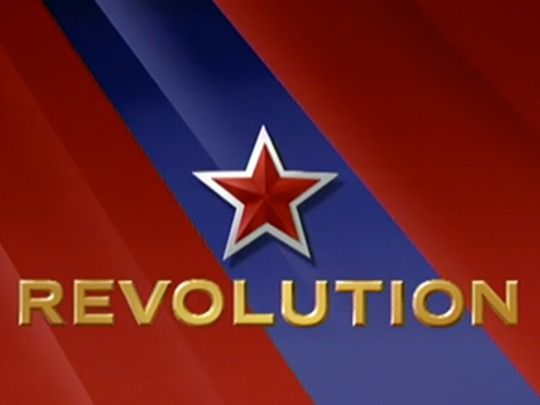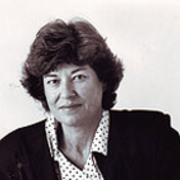
Revolution
Television, 1996
This series has two backgrounds:
Revisiting Revolution

Revolution: an introduction from 1996

Revisiting Revolution
By Marcia Russell 08/08/2009
It is now 13 years since Revolution was made for Television New Zealand, and there has been no equivalent documentary of recent political history on our screens since as far as I can ascertain. The series mapped the social and economic transformation of New Zealand society in the 1980s and early 1990s, and took us to the night of the first MMP election in New Zealand: to Day One of another political revolution that profoundly changed the way in which New Zealand citizens are represented in the democratic process. It was meant to be "the story so far", but as far as television was concerned it was "the story, full stop, go to black".
Regrettably recent history gets dumped into the archives until it becomes ancient history, at which point the programmers sigh "boring" and schedule another reality series on celebrity dog-walkers. So we forget what happened yesterday, let alone what happened last year or in the last decade, and move on uncertainly, vulnerable to ideologies that want to claim ownership of our past and mastery of our futures.
I talk with young undergraduate students at university and they say: "What's Rogernomics?" and "Who's Muldoon?" I shouldn't be surprised and I know people will soon be saying "Who's Winnie?" Most of us who still know the name probably have only a vague recollection of successive events when "Winnie" Peters went fishing, while holding the political destiny of the country in his hands after the knife-edge outcome of that first MMP election in October 1996.
There was at least one fat hour of fascinating documentary material to be assembled out of the first three months alone of MMP in New Zealand. It's a cause for regret that nobody has seen fit to pull together the events of the following decade and remind citizens that they were there too, making history. It is not as if it is a difficult project to realise. The material is there, paid for by the citizens of New Zealand and sitting in the archives; many of the political protagonists are still alive and more willing to go on the record from a disinterested position (which usually offers more compelling and surprising narratives). And if anyone should need a few pointers, I'm available to give useful tips on how to organise this kind of social documentary to get the best bang for your buck in the shortest possible production time, and how to avoid political pressure while doing so.
A social historian who was asked to examine the proposal for Revolution on behalf of NZ on Air back in 1995 initially gave it a thumbs down saying: "This isn't a documentary, it's a re-run." We survived that assessment and the series was made; but I realise, on reflection, that he was right and that that was exactly the point. We wanted to make Revolution because we believed that unless we re-run and re-examine our recent history we are in constant danger of forgetting, and forgetting can render us passive about the present, and slaves of the future.
- Journalist and producer Marcia Russells, OBE, was second in command of TV3's news and current affairs team. She worked with her partner Tom Finlayson on a number of documentaries, including Revolution. Russell died on 1 December 2012.
Revolution: an introduction from 1996
By Marcia Russell 08/08/2009
This piece is taken from the introduction to Marcia Russell's Revolution: New Zealand from Fortress to Free Market. The tie-in book to the Revolution TV series was published in 1996 by Hodder Moa Beckett.
Revolution is a journalist's assembly of observations about the transformation of New Zealand in the 1980s and early 90s. It makes no pretence to academic analysis, nor to any profound thesis. That is the territory of historians much better qualified than I to take a broad sweep and put New Zealand's revolution into a context which transcends recent history. This book seeks only to put in context some of the events of those turbulent years through the memories and opinions of movers and shakers, witnesses and "ordinary" people who were caught up, one way or another, with change and its repercussions. Without their generosity of spirit, lively intelligence and thoughtful recollections, combined with the superb conversational interviews of Ian Fraser, this account of the times would never have been recorded.
Journalistic habits die hard. I have a serious difficulty with expressing any personal assessment of the revolution. It happened, we adjusted to it, we survived, we found new benchmarks for beliefs and new expectations of ourselves and our country. I have left it to the people who shared their thoughts with us to tell their stories their way and leave it to the reader to decide for themselves.
But reliving those times I was impressed by one shared characteristic. It was a powerful sense of patriotism, a strong belief in the special qualities of New Zealanders and an optimism about the future. There are, of course, different views of how the vision could be realised and a variance of opinion on the judgement scale of "good" or "bad" results. But at the core, from farming women to former Prime Ministers, I found a unifying respect for the resilience of New Zealanders and a pride in what we had done; what we might do in the future.
The fortress we once lived in was a different country. Even with rose-tinted nostalgia we can see the insularities which distorted New Zealand's view of its impregnability. Today, wiser perhaps, we are suspiciously re-examining the new free market order and finding that it too can conjure up a prison-like environment. For me that prison is the demand of the market for "measurement"; that we may be in danger of knowing the price of everything, but the value of nothing.
As we enter new political territory we are forced to examine the balance sheet delivered by the revolution. The virtues of the "market" are now being debated. By almost all measurements its rewards have been unevenly divided and there is a suspicion that in the rush to embrace the changes we trampled into near-oblivion some old hard-to-measure values, like ethics and morality. The notion of "good for all" became a somewhat outmoded commodity.
I believe there is a re-think going on, and that, in the new climate signified by our political system, the debate will widen. I like to believe it will force us to re-adopt some of the measures which, like the baby, were thrown out with the bath water.
There are omissions in Revolution which will be obvious to many people. To avoid political proselytising and the impost of "balance" in this election year of 1996 the decision was made to not interview any current leaders of political parties. Those who expect to find the views of Jim Anderton, Helen Clark, Winston Peters or Richard Prebble in these pages will be disappointed. But those people are on centre stage now and there will be time to seek their views after they have helped, one way or another, to write the next chapter of New Zealand's living history.
In the meantime Revolution is offered, simply, as the story so far.
- Reproduced with permission